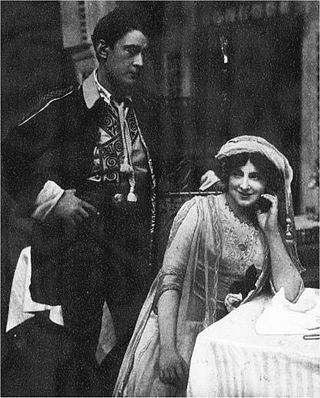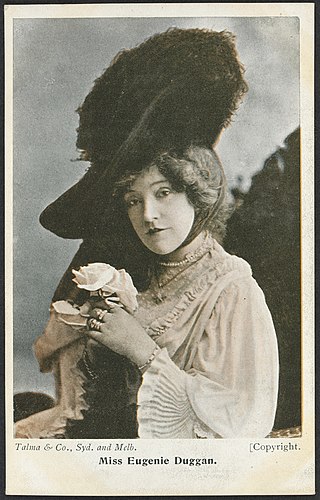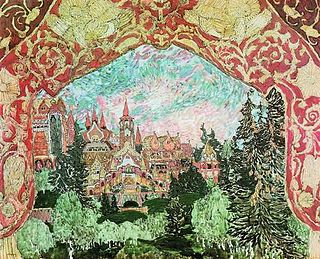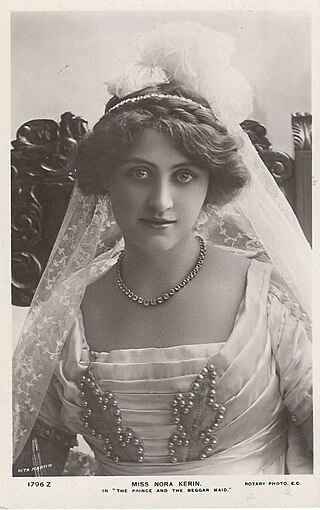
Ein Walzertraum is an operetta by Oscar Straus with a German libretto by Leopold Jacobson and Felix Dörmann, based on the novella Nux, der Prinzgemahl by Hans Müller-Einigen from his 1905 book Buch der Abenteuer.

George Relph, CBE was an English actor. He acted in more than a dozen films, and also many plays. He served in the British Army in the First World War, and was shot in the leg, hindering his return to acting. But Relph eventually got back on stage, and his career continued. His son, Michael, became a producer in the British film industry. His last role was Tiberius in the 1959 film version of Ben Hur which was released five months before Relph's death.

The Balkan Princess is a musical in three acts by Frederick Lonsdale and Frank Curzon, with lyrics by Paul Rubens and Arthur Wimperis, and music by Paul Rubens. It opened at London's Prince of Wales Theatre on 19 February 1910. The cast included Isabel Jay and Bertram Wallis. There was a successful Broadway run in 1911 that used a libretto by Leonard Liebling, and the show toured widely thereafter.

Le papillon is a 'fantastic ballet' in two acts of 1860, with choreography by Marie Taglioni and music by Jacques Offenbach to a libretto by Jules-Henri Vernoy de Saint-Georges.

Cinderella is a ballet-féerie in three acts, with the choreography of Enrico Cecchetti and Lev Ivanov supervised by Marius Petipa. Music is by Baron Boris Fitinhoff-Schell; the libretto is by Lidia Pashkova and Ivan Vsevolozhsky. It was first presented by the Imperial Ballet on 17 December [O.S. 5 December] 1893 at the Imperial Mariinsky Theatre in St. Petersburg, Russian Empire.

Henry Hawes Craven Green was an English theatre scene-painter. He collaborated with Henry Irving, Richard D'Oyly Carte and Herbert Beerbohm Tree, producing stage sets of unprecedented realism. Craven's career lasted from 1853 to 1905, spanning the end of the era of gas lighting in theatres and the beginning of electrical lighting; he developed new techniques to co-ordinate the appearance of theatre settings during the transition from gas to electricity. He was regarded as the finest scene-painter of his day and was the last major scenic designer in the ultra-realistic tradition.
Cowley Wright was an English actor.

Princess Caprice is a musical theatre work described as a "comedy with music", in three acts, with music by Leo Fall. The book was adapted by Alexander M. Thompson from Fall's operetta Der liebe Augustin by Rudolf Bernauer and Ernst Welisch. The lyrics were by A. Scott-Craven, Harry Beswick and Percy Greenbank. Much of the music was from Der liebe Augustin, but Fall composed four new numbers, with lyrics by Scott-Craven, for the new piece. The story involves mistaken identities and farcical financial dealings at a European palace, following which the proper romantic partners are paired happily.

Lauderdale Valentine John Maitland was a British stage and film actor.

Eugenie Marian Duggan was a popular Australian stage actress. She was the sister of the actors Edmund, P.J. and Kathleen Duggan. She began studying acting, won a number of elocution competitions and made her professional debut in 1890 in Romeo and Juliet.

George W. Cross was an Australian actor and casting director. For many years he was a leading actor, producer and director on stage, including a stint in San Francisco.

Coralie Blythe, was an English actress and singer, who is best remembered for her numerous postcard photos and her roles in Edwardian musical comedy. Although she never became a big star, she worked steadily in London's West End and in British provincial theatres from her teen years until after World War I, especially for producer George Edwardes, and had a few roles in America. She sometimes performed with her husband, Lawrence Grossmith, and her brother, Vernon Castle.

The Magic Mirror is a ballet-féerie in four acts and seven scenes, originally choreographed by Marius Petipa with music by Arseny Koreshchenko. The libretto is based on the 1812 fairy tale Snow White by the Brothers Grimm and the 1833 poem The Tale of the Dead Princess and the Seven Knights by Alexander Pushkin. The ballet was premièred on the 22 February [O.S. 9 February] 1903 at the Imperial Mariinsky Theatre in St. Petersburg, Russia.

Raimund Leo Pechotsch was a composer of romantic and incidental musical theatre pieces. He was a Roman Catholic who also conducted liturgical music.

Eric Mayne was an American actor.

Austen Hurgon was an actor, singer, theatre director and librettist for several successful Edwardian musical comedies of the 1900s and 1910s.

Arlette is a 1917 operetta in three acts by Austen Hurgon and George Arthurs with lyrics by Adrian Ross and Clifford Grey. Produced by George Grossmith Jr. and Edward Laurillard it was adapted from the French with music by Jane Vieu, Guy Le Feuvre and Ivor Novello. It opened at the Shaftesbury Theatre in London on 6 September 1917 where it ran for 260 performances. It starred Winifred Barnes, Joseph Coyne and Stanley Lupino.

Kitty Loftus was an English dancer, singer and actor-manager. A leading soubrette of the 1890s and 1900s in comedies, burlesque, pantomime and musical plays, at the height of her career she performed with her Kitty Loftus Company. One critic praised her as "a tricky sprite and a fantastic elf." In her last years, she performed in variety in music halls and on tour.

John Brunton was a Scottish scenic artist who worked in theatres in Britain and Australia. Brunton was brought to Australia in 1886 by the theatrical partnership of Williamson, Garner and Musgrove. From about the mid-1890s he worked on productions by Bland Holt, known for his spectacular touring productions of melodramas and pantomimes. Brunton died in July 1909 in Sydney. He was the father of the popular actress, Dorothy Brunton.

Nora Maude Kerin was a British theatre actress and stage beauty of the early 20th-century.
























